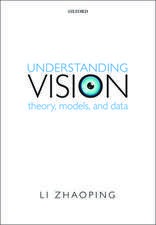Visual Reflections: A Perceptual Deficit and Its Implications: Oxford Psychology Series
Autor Michael McCloskeyen Limba Engleză Hardback – 30 apr 2009
Din seria Oxford Psychology Series
- 30%
 Preț: 787.68 lei
Preț: 787.68 lei - 11%
 Preț: 314.60 lei
Preț: 314.60 lei - 23%
 Preț: 330.78 lei
Preț: 330.78 lei - 34%
 Preț: 1595.08 lei
Preț: 1595.08 lei - 30%
 Preț: 590.97 lei
Preț: 590.97 lei -
 Preț: 356.82 lei
Preț: 356.82 lei - 11%
 Preț: 286.36 lei
Preț: 286.36 lei - 30%
 Preț: 1859.05 lei
Preț: 1859.05 lei - 22%
 Preț: 328.28 lei
Preț: 328.28 lei - 22%
 Preț: 485.66 lei
Preț: 485.66 lei - 34%
 Preț: 643.07 lei
Preț: 643.07 lei - 31%
 Preț: 448.18 lei
Preț: 448.18 lei - 46%
 Preț: 464.82 lei
Preț: 464.82 lei - 30%
 Preț: 675.99 lei
Preț: 675.99 lei - 33%
 Preț: 497.94 lei
Preț: 497.94 lei -
 Preț: 341.30 lei
Preț: 341.30 lei - 50%
 Preț: 760.43 lei
Preț: 760.43 lei - 22%
 Preț: 354.88 lei
Preț: 354.88 lei - 19%
 Preț: 453.58 lei
Preț: 453.58 lei - 34%
 Preț: 802.03 lei
Preț: 802.03 lei - 27%
 Preț: 351.88 lei
Preț: 351.88 lei - 8%
 Preț: 340.84 lei
Preț: 340.84 lei - 39%
 Preț: 1218.33 lei
Preț: 1218.33 lei - 34%
 Preț: 1167.22 lei
Preț: 1167.22 lei - 34%
 Preț: 609.78 lei
Preț: 609.78 lei - 8%
 Preț: 310.81 lei
Preț: 310.81 lei - 28%
 Preț: 431.42 lei
Preț: 431.42 lei - 34%
 Preț: 1168.02 lei
Preț: 1168.02 lei - 34%
 Preț: 818.86 lei
Preț: 818.86 lei - 50%
 Preț: 520.77 lei
Preț: 520.77 lei -
 Preț: 127.27 lei
Preț: 127.27 lei -
 Preț: 282.75 lei
Preț: 282.75 lei - 24%
 Preț: 386.49 lei
Preț: 386.49 lei - 34%
 Preț: 1434.66 lei
Preț: 1434.66 lei - 27%
 Preț: 502.06 lei
Preț: 502.06 lei - 28%
 Preț: 605.94 lei
Preț: 605.94 lei - 23%
 Preț: 523.62 lei
Preț: 523.62 lei - 34%
 Preț: 762.60 lei
Preț: 762.60 lei - 28%
 Preț: 488.97 lei
Preț: 488.97 lei - 22%
 Preț: 422.01 lei
Preț: 422.01 lei - 31%
 Preț: 397.59 lei
Preț: 397.59 lei - 34%
 Preț: 599.38 lei
Preț: 599.38 lei - 16%
 Preț: 341.24 lei
Preț: 341.24 lei
Preț: 354.55 lei
Preț vechi: 673.80 lei
-47% Nou
Puncte Express: 532
Preț estimativ în valută:
67.84€ • 70.83$ • 56.15£
67.84€ • 70.83$ • 56.15£
Carte tipărită la comandă
Livrare economică 24-31 martie
Preluare comenzi: 021 569.72.76
Specificații
ISBN-13: 9780195168693
ISBN-10: 0195168690
Pagini: 320
Ilustrații: 75 line illus
Dimensiuni: 236 x 155 x 25 mm
Greutate: 0.6 kg
Editura: Oxford University Press
Colecția OUP USA
Seria Oxford Psychology Series
Locul publicării:New York, United States
ISBN-10: 0195168690
Pagini: 320
Ilustrații: 75 line illus
Dimensiuni: 236 x 155 x 25 mm
Greutate: 0.6 kg
Editura: Oxford University Press
Colecția OUP USA
Seria Oxford Psychology Series
Locul publicării:New York, United States
Recenzii
This book is for anyone who has marveled at the ubiquitous and fundamental nature of spatial vision and its moment by moment influence on everyday life. Michael McCloskey takes on some of the most difficult questions in this arena. How are values on spatial dimensions selected? What is the functional role of spatial reference frames on perception and action? How are spatial frames formed? What are their components? How does the brain compute them, and what are the necessary and sufficient requirements? His intriguing conclusions are based on the integration of a large body of cross-disciplinary research and his insights from single case studies. This is a journey worth taking.
This book gives a fascinating and detailed insight into the visual world of a unique and extraordinary individual. McCloskey has assembled a plethora of careful observations showing that this apparently unexceptional person, A.H., habitually sees the world in a mirror-reversed fashion, though surprisingly without this greatly affecting her everyday life. The book challenges current accounts of visuospatial cognition and its development, as well as some current philosophical accounts of perception.
This book gives a fascinating and detailed insight into the visual world of a unique and extraordinary individual. McCloskey has assembled a plethora of careful observations showing that this apparently unexceptional person, A.H., habitually sees the world in a mirror-reversed fashion, though surprisingly without this greatly affecting her everyday life. The book challenges current accounts of visuospatial cognition and its development, as well as some current philosophical accounts of perception.
Notă biografică
Michael McCloskey is Professor of Cognitive Science at Johns Hopkins University. His research focuses on mental representation and computation in visual-spatial cognition and lexical processing. He studies cognitive deficits in children and adults with brain damage or learning disabilities, with the aim of gaining insight into normal cognitive representations and processes, and how they are disrupted when the brain is damaged or fails to develop normally. He received his Ph.D. in Cognitive Psychology from Princeton University.










